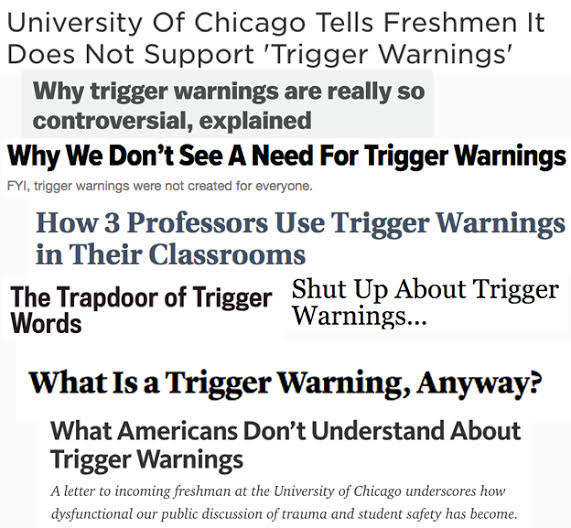Originally from https://www.buzzfeed.com/caseygueren/trigger-warnings-in-the-classroom?utm_term=4ldqpia
There’s a difference between being triggered and being uncomfortable.
With college back in session, the topic of trigger warnings in the classroom is back in the news.

In a recently released letter to incoming freshmen, the University of Chicago Dean of Students John Ellison wrote that students should not expect trigger warnings at the school.
"Our commitment to academic freedom means that we do not support so-called 'trigger warnings,'" Ellison wrote. "We do not cancel invited speakers because their topics might prove controversial, and we do not condone the creation of intellectual 'safe spaces' where individuals can retreat from ideas and perspectives at odds with their own."
kenudigit / Creative Commons / Via Flickr: kenudigit
First, let's talk about what trigger warnings actually are.

While there is no official definition of a trigger warning, psychologists broadly define it as a heads-up about content that could be triggering for someone with a history of trauma. What that looks like could vary, and we'll get to that in a bit.
Along those lines, a trigger would be something that elicits a symptomatic response in someone with a history of trauma — maybe flashbacks or a panic attack.
For someone with post-traumatic stress disorder (PTSD), a trigger warning could help them prepare for what's to come, giving them an opportunity to draw on strategies or tools to deal with that.
Justine Zwiebel / BuzzFeed / Via buzzfeed.com
Though the University of Chicago letter is referring to concerns about academic freedom, it sparked a debate about the function and efficacy of trigger warnings in the classroom, especially as they relate to mental health and trauma.

Anna Borges / Via Vox / The Atlantic / Pacific Standard / NPR / The Chronicle of Higher Education / The Huffington Post / The Stranger
- Ryan Howes, PhD, California-based clinical psychologist
- Ruth Goldston, PhD, New Jersey-based psychologist
- Nance Roy, EdD, clinical director at the Jed Foundation, and assistant clinical professor at the Yale School of Medicine Department of Psychiatry.
- Andrea Bonior, PhD, clinical psychologist and adjunct professor at Georgetown University
- Eileen Zurbriggen, PhD, psychologist and professor at the University of California, Santa Cruz
- Elana Newman, PhD, research director for the Dart Center for Journalism and Trauma and professor at the University of Tulsa
Here's what they had to say:

No comments:
Post a Comment